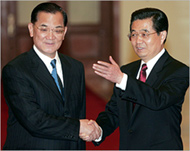Chen’s party wins Taiwan poll
Taiwan President Chen Shui-bian’s Democratic Progressive Party has won an election, securing a fresh mandate to pursue an independence-leaning policy towards rival China.

Although the National Assembly poll was held for the sole purpose of ratifying constitutional reforms already approved by parliament, relations with China dominated the agenda as the vote followed bridge-building visits by opposition leaders to the mainland.
The Democratic Progressive Party (DPP) won 42.52% of votes to affirm its standing as Taiwan’s largest political party, figures from the Central Election Commission showed. The main opposition Kuomintang (Nationalist Party, KMT) finished with 38.92%.
“It helps ease pressure on Chen to improve relations with China,” said Philip Yang, a professor of political science at National Taiwan University. “Chen can breathe a sign of relief.”
China relations
However, he said the record low turnout – estimated at 23% – showed many people did not care about the poll.
 |
|
China has sought to engage the |
With his political adversaries seeking to build relationships with rival China, Chen had been under rising pressure to find ways to break the ice with Beijing, which refuses to deal with him or his government because of their independence stance.
China claims the democratic island of 23 million as its own, and enacted an anti-secession law in March sanctioning war if Taiwan pushes for formal statehood.
China had sought to marginalise Chen by engaging the opposition KMT and People First Party (PFP), which both oppose Taiwan independence.
Demands toned down
In meetings with KMT leader Lien Chan and PFP leader James Soong, Beijing offered Taiwan a slew of economic incentives, aiming to win the hearts of the island’s people.
Put on the defensive, Chen has toned down his independence views in recent months – angering some of his core supporters – but still rejects Beijing’s cherished one China principle.
 |
|
The poll had a record low turnout |
“With the DPP shrinking from its position on Taiwan independence and the KMT leader shaking hands with Hu Jintao in China, we need smaller parties to counter the China mania,” said 82-year-old retiree Cheng Ah-lai.
Cheng braved heavy rain lashing most of Taiwan on Saturday to vote for the small Taiwan Solidarity Union, which advocates the creation of the Republic of Taiwan, but ended up with only 7.05% of votes. The PFP came fourth with 6.11%.
‘Victory for Taiwan’
Analysts say the election has focused on China rather than the constitutional reforms because the two biggest parties, the DPP and KMT, support the changes. With 81% of the Assembly’s 300 seats between them, the reforms are set to be approved.
The constitutional amendments will halve the size of the legislature, revamp the electoral system and introduce referendums to approve future changes to the constitution.
|
“It helps ease pressure on Chen to improve relations with China” Philip Yang, a professor of political science at National Taiwan University |
China fears Taiwan could use a referendum to assert independence.
“With more than half of the votes cast in favour of constitutional reform, this is a victory for democracy, a victory for reform and a victory for Taiwan,” Chen said in a statement.
“Taiwan’s 23 million people have once again overcome difficulties and written new history to deepen Taiwan democracy.”
Independence boost
At the last national election in December, the legislative polls, the DPP had won 35.7% of votes compared to the KMT’s 32%.
Chen’s pro-independence policies got another boost earlier on Saturday when isolated Taiwan re-established ties with the
tiny Pacific island of Nauru, scoring a modest victory in the diplomatic tug of war with China.
The National Assembly, a legacy from Taiwan’s former dual parliament system, is being formed only for the purpose of voting on the constitutional amendments, and will be dismantled by the end of the year.